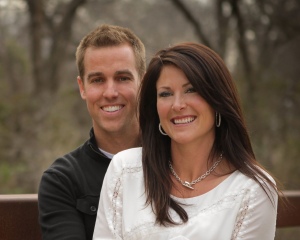Today we start a new Friday series called “5 Questions About…” 
Recently my friend, Lee Hanssen, who is the director of student ministry at our church, (and just happens to be a rodeo rider on the side :)), preached on Jeremiah 29:11. “For I know the plans I have for you, declares the Lord, plans for welfare and not for evil, to give you a future and a hope.”
Oh my gosh, have you seen that verse quoted on all the cards everywhere in the history of the world without end amen for anyone who was sad, or getting married, or graduating, or…? I loved Lee’s message and I wanted him to share some of it with you.
1. What made you choose this popular verse for your text?
I’ve noticed that as Christians, we can feel the need to spiritualize many situations and come up with pat answers like, “well God must be testing me” or “God has a plan for my life”. We have all sorts of these saying we let roll off our tongues with little thought or understanding. While I believe that God does test us and know He indeed has a plan, it usually rubs me the wrong way. Maybe I’m far less spiritual but I’m usually thinking something more along the lines of “this sucks”.
2. Are there ways you think people have abused or mis-interpreted this verse?
I don’t think people abuse the Bible intentionally, but we can easily mis-interpret if we take verses out of context. Verses that have been picked out of Scripture and slapped on greeting cards, paintings, even tattoos are all part of a much larger story. This is the case when God tells the Israelites He has a plan for their lives in Jeremiah 29:11.
3. Could you talk about your take on the word that is often translated “welfare” in this verse?
This book of the Bible was written in Hebrew. And often Hebrew words have many different translations. Sometimes the English word doesn’t quite pack the punch of the original word. Such is the case here. This word more accurately means wholeness. Wholeness and welfare are two very different things. What most people don’t know is this promise was given to God’s chosen people who were held in captivity for over 70 more years after this verse. They were reminded God had a plan for their lives not while comfortably sitting in the Promised Land, but while being held in slavery. That’s the bigger story behind this text and it changes everything.
Furthermore I love that God’s plans are first for our wholeness. God’s motives behind the plan He has for us are centered on who we are becoming and less concerned with the exact details along the way. It’s our choice to recognize and accept His invitations, amidst and despite our circumstances. We so often want to jump to His promise of having a future and a hope without the wholeness piece. The problem is we can’t have a future and a hope, one worth living anyways, unless we embrace becoming whole-hearted people.
4. How has God used this verse in your life?
I thought by the time I was 25 I would be married, well advanced in my career, drive a suburban, and coach little league. And when those things didn’t happen for me I was frustrated (which is really just a cute word for really angry). And it was in those moments I had to ask myself, “is God still good if my life doesn’t look like what I thought it should?” and “Can I embrace what God might have for me here?” It was in those moments I was confronted with the reality that while I said my hope was in God, it was really in a steady job, wife, and retirement plan.
It was in those seasons God revealed to me that I felt entitled to a pain free life because I followed Him. Through that process it seemed like God gave me opportunity after opportunity to choose wholeness. Most of the hardest and confusing times in my life also proved to be the most refining. At times it meant letting things in me die. And at other times it meant letting things in me come to life. Both are a part of the journey.
5. What questions did you share at the end of your message?
- Is it enough to know the God loves you? (In cancer, singleness, infertility, etc?)
- What’s God’s inviting you to? (Does something need to die? Come to life?)
So those are some thoughts from my friend, Lee. What have the rest of you learned about God’s plans for your life?



This is SUCH an important verse to teach on. Thank you, Lee, and thank you, Laura. I was in college when I first heard the context behind Jeremiah 29:11 and it had a radical effect on my view of Scripture: What other verses had I misunderstood? What other facets of God’s character had I missed because of an incomplete or watered-down reading? Thanks for helping us get a fuller understanding of this verse!
Thanks Maggie! I too, so appreciate Lee’s words, and your “next step” of considering other verses we may be mis-reading out of context!
I absolutely love this verse of scripture as well. Many times when I am going through some of the biggest trials of my life and want to give up, I go straight to this scripture to reassure my that the trials have a far greater purpose and are molding me into His image.
Yes! Sometimes the reassurance we need isn’t more power, but more perspective…a bigger picture (or the reassurance that God has the bigger picture we can’t see)